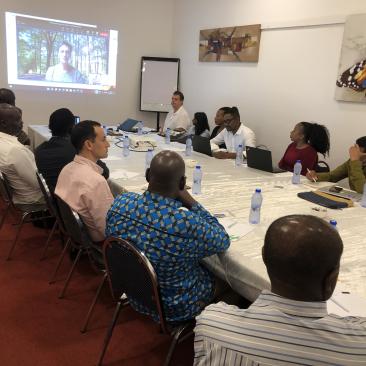
Members from FSC’s economic, environmental, and social chambers from the following African countries were present: Cameroon, Cabo Verde, the Democratic Republic of Congo, Egypt, Gabon, Ghana, Kenya, Nigeria, the Republic of Congo, South Africa, Tanzania, Uganda, Zambia, and Zimbabwe.
The FSC strategy 2021-2026
FSC’s Director General, Kim Carstensen, kicked off day 1 of the meeting with an overview of the FSC global strategy 2021–2026. FSC Africa staff followed up with updates on progress since the last meeting in 2019. Harrison Kojwang, Regional Director, FSC Africa, presented an overview of the regional programme and invited regional coordinators from the Congo Basin (George Akwah), Eastern Africa (Annah Agasha), and Southern Africa (Manushka Moodley) to share progress reports from the sub-regions. This session also discussed the status of standards development in Africa.
Three directors from the FSC Board, Patrick Spencer (USA), Mark Assante (Ghana) and Stuart Valentine (Zimbabwe), attended the event. After Kim introduced them to the African membership, each gave short remarks. For the first time, the Board of Directors, the chief decision-making body of FSC after the general assembly has two African members.
The FSC Africa advisory committee
The event saw the installation of the FSC Africa advisory committee, a group of high-level experts from the forestry sector with the task of increasing FSC relevance on the continent. According to Harrison Kojwang, Regional Director, FSC Africa, each member of the advisory committee brings deep sectoral knowledge and experience that will be invaluable in advancing African regional priorities and promoting FSC’s agenda on the continent.
The committee first met FSC Africa staff on Sunday 31st July and then attended the Africa regional members’ meeting on August 1-2, where they gave valuable contributions. The committee members include:
- Dr Musonda Mumba (Zambia) – Current head of the United Nations Environment’s Terrestrial Ecosystems team, and incoming Secretary General of the Convention on Wetlands of International Importance (Ramsar).
- Brian Aitkin (South Africa) - Experienced forester, forestry entrepreneur (South Africa and Mozambique), and former Chair of Forestry South Africa.
- Professor Godwin Kowero (Tanzania) – is a well-known forest economist who founded and is the current Executive Secretary of the African Forest Forum.
- Dr James Kiyapi (Kenya) - Forestry academic and senior Kenyan government official (former Permanent Secretary in the Ministries of Environment and Health)
- Ms Prudence Galega (Cameroon) - One of Africa's negotiators at the UN Framework Convention on Climate Change and Biodiversity, she worked as a judge before becoming permanent secretary at the Ministry of Environment, Nature Protection, and Sustainable Development
- Dr Yemi Katerere (Zimbabwe) - Former Chief Executive of the Zimbabwe Forest Commission and former Regional Director for Eastern and Southern Africa of the International Union for Conservation of Nature and Natural Resources (IUCN).
IFL, conversion, and remedy framework
FSC Africa members debated FSC policies on conversion and remedy framework and intact forest landscapes (IFLs) protection in certified natural forests. The former promotes restoration of forest ecosystems through social and environmental remedy with standardised requirements against which the remediation and restorative activities of non-conforming companies will be assessed. The latter is set to protect high-value conservation (HVC) forests with "forest and non-forest ecosystems minimally influenced by human economic activity, with an area of at least 500km2 (50,000 ha) and a minimal width of 10km" known as IFLs.
FSC members will further discuss these policies and vote on them in motions at the upcoming FSC general assembly in October 2022 in Bali, Indonesia. The day ended with updates on the Bali general assembly. In this session, members learned how to find and change motions and how to take part and vote onsite and remotely.
Motions for the general assembly
Tuesday, August 2nd, was day 2 of the Africa regional members’ meeting. The day started with members of the three chambers leading parallel discussions where they examined closely the motions set to be voted on in Bali and shared their feedback in the plenary. Thematic breakout meetings on social issues, Indigenous peoples, and trade unions; sustainable intensification, and community family forests followed.
The day was then closed with a session on climate change and ecosystem services (ES). Here, participants examined the FSC ecosystem services (ES) procedure and learned how the organisation is tackling the climate change issue. The ES procedure is a tool that can be used to verify how responsible forest management directly or indirectly benefits forest ecosystems, biodiversity, ecological processes, livelihoods, and communities.
The first verified ecosystem service claims in Africa were made in South Africa (water) and Namibia (biodiversity), in FSC certified forests. A pilot on the application of the ES procedure is being implemented in three certified concessions in the Congo Basin.
At the end of the event, Kim, and Harrison on the behalf of FSC staff thanked Mark Assante from the Timber and Woodworkers Union in Ghana and his team for hosting the FSC Africa regional members’ meeting and for supporting members in the visa application process. They also thanked Leon Muba Mopili, FSC Africa Membership Coordinator, Grit Silberstein, Executive and Project Assistant Operations, Mădălina Mirea, Administrative Assistant, Engagement and Paule Muriel Mabiala, Administrative Assistant, Congo Basin for planning and coordinating the event.